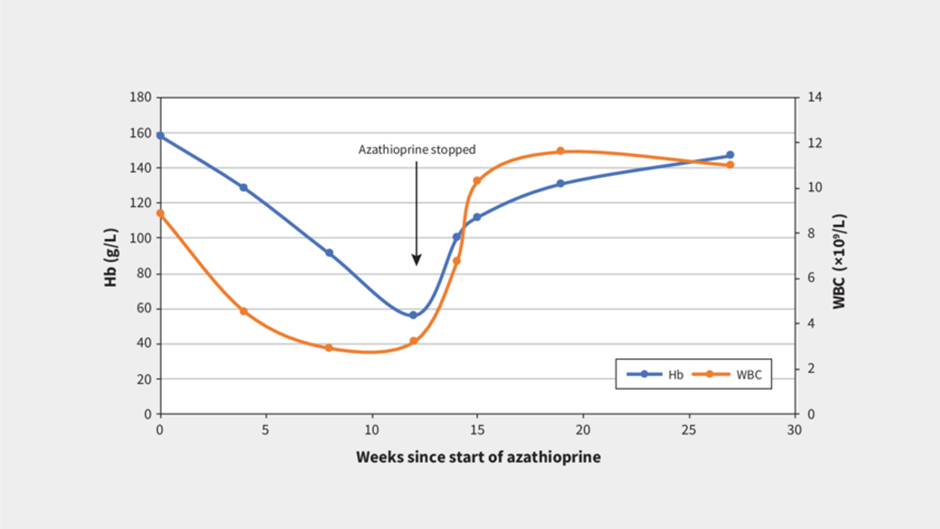A nurse is caring for a client who is taking azathioprine to treat rheumatoid arthritis. Which of the following laboratory values indicates an adverse effect of this medication?
BUN 15 mg/dL
WBC 3,000/mm
Hct 45%
Platelets 250,000/mm
The Correct Answer is B
Choice A Reason:
BUN 15 mg/dL (blood urea nitrogen) is incorrect. An elevated BUN level can indicate kidney dysfunction or dehydration, but it's not typically associated with azathioprine's adverse effects. Azathioprine is known to affect bone marrow, leading to decreased blood cell counts, rather than directly impacting kidney function.
Choice B Reason:
WBC 3,000/mm³ (low white blood cell count) is correct. Azathioprine is an immunosuppressive medication used to treat various conditions, including rheumatoid arthritis. One of its known adverse effects is bone marrow suppression, which can lead to decreased production of blood cells, including white blood cells (WBCs). A low WBC count (leukopenia) can increase the risk of infections due to compromised immune function, making it an important adverse effect to monitor in individuals taking azathioprine.
Choice C Reason:
Hct 45% (hematocrit) is incorrect. A hematocrit of 45% is within the normal range for both men and women. Azathioprine adverse effects usually manifest as blood cell-related issues (such as leukopenia) rather than directly impacting hematocrit levels.
Choice D Reason:
Platelets 250,000/mm³: Platelets within the range of 150,000 to 400,000/mm³ are considered normal. Azathioprine typically affects white blood cells more prominently than platelet counts.

Nursing Test Bank
Naxlex Comprehensive Predictor Exams
Related Questions
Correct Answer is D
Explanation
Choice A Reason:
Hct 44% is incorrect. A hematocrit (Hct) level of 44% falls within the normal range for most adults. It represents the proportion of red blood cells in the blood and is not typically concerning unless it significantly deviates from the normal range, indicating anemia or polycythemia.
Choice B Reason:
WBC count 5,000/mm3 is incorrect. A white blood cell (WBC) count of 5,000/mm3 falls within the normal range for adults, reflecting a normal immune response. There's usually no cause for immediate concern unless there are specific clinical symptoms or significant deviations from the normal range.
Choice C Reason:
Potassium 4.2 mEq/L is incorrect. A potassium level of 4.2 mEq/L is within the normal range for serum potassium levels. It's crucial to monitor potassium levels, especially with medications that can affect electrolyte balance, but this value falls within the typical range and may not prompt immediate action unless there are notable fluctuations or clinical symptoms related to potassium imbalance.
While the majority of the laboratory values provided fall within the normal range, the value that the nurse should consider reporting to the provider, particularly when a client is taking amitriptyline, is:
Choice D Reason:
Total bilirubin 1.5 mg/dL is correct. Elevated levels of total bilirubin might indicate potential liver function impairment. Amitriptyline, an antidepressant, can affect liver enzymes in some individuals, causing hepatic changes. Therefore, it's crucial to monitor liver function tests, including total bilirubin, during amitriptyline therapy. An increase in bilirubin levels could signal hepatotoxicity or liver dysfunction related to the medication.
Correct Answer is A
Explanation
Choice A Reason:
Rotate the application site every week is correct. Rotating the application site is essential to prevent skin irritation or sensitization. Advising the client to apply the patch to a different area of clean, dry, non-hairy skin each time helps reduce the risk of skin irritation at the application site.
Choice B Reason:
The transdermal patch can cause insomnia is incorrect. Insomnia is a potential side effect of nicotine replacement therapy (NRT) patches, including transdermal nicotine patches, but it's not a universal side effect for everyone using the patch.
Choice C Reason:
Leave the patch in place for 8 hr. each day is incorrect. Transdermal nicotine patches are typically worn for 16–24 hours each day, depending on the specific product instructions. Leaving the patch on for a shorter duration might reduce its effectiveness in supporting smoking cessation.
Choice D Reason:
The transdermal patch releases nicotine rapidly into the bloodstream is incorrect. Transdermal nicotine patches deliver nicotine slowly through the skin into the bloodstream over an extended period rather than providing a rapid release. This gradual release helps reduce cravings and withdrawal symptoms associated with smoking cessation.

Whether you are a student looking to ace your exams or a practicing nurse seeking to enhance your expertise , our nursing education contents will empower you with the confidence and competence to make a difference in the lives of patients and become a respected leader in the healthcare field.
Visit Naxlex, invest in your future and unlock endless possibilities with our unparalleled nursing education contents today
Report Wrong Answer on the Current Question
Do you disagree with the answer? If yes, what is your expected answer? Explain.
Kindly be descriptive with the issue you are facing.
